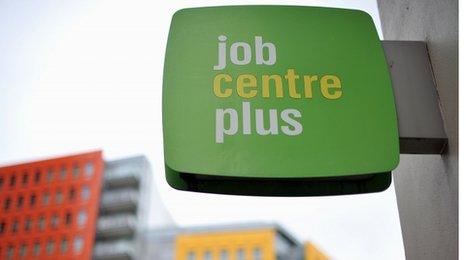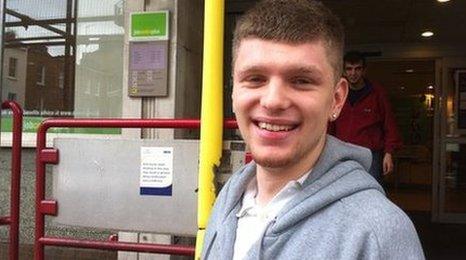Youth jobs: Is unemployment answer in the Netherlands?
- Published

Young trainees learn construction skills in Den Bosch
Youth unemployment in the Netherlands is the lowest in the whole of Europe. So what can we learn from the Dutch approach?
Just opposite the railway station in the old city of Den Bosch is a modern, glass-fronted employment centre.
But it's a real struggle to spot anyone under 30 years old browsing inside.
"I suppose you've got to worry but I would say if you want a job you can always find one," said 17-year-old Sara van Oya.
"All these problems with the economy? The newspapers make it out to be worse than it really is."
The Netherlands is often held up as the model of how to deal with youth unemployment.
Nine per cent of under-25s there are looking for work, less than half the rate of the UK and the lowest in the EU.
If you are young and unemployed in the Netherlands, you are expected to sit down with a careers' adviser.
You are made an offer based on your skills; a job, training or a combination of both.
That offer exists until you are 27 years old.
But here's the catch: if you don't like the offer or don't turn up for work then you can expect to have your benefits cut back.
"We have a lot of choices for young people but they must accept that help," said Karin van Meer from the local city council.
"They will get a second chance and a third chance but if they don't want to take it, then they will lose benefits and services and that's sorry for them."
'Be a big man'
On the outskirts of the city in a busy industrial estate is a large construction college teaching skills from bricklaying to window fitting.
Groups of teenagers are gathered around in the huge workshop learning how to make door frames.
Twenty-year-old Rene Spiakers is just coming to the end of his four-year course and will soon start as a full-time carpenter with a local firm.
He said: "I will get €10 an hour (£8.70) so it's really not bad but I want to go higher and higher. I want to build up and be a big man."
This kind of practical apprenticeship system is very different from the ones we are used to in the UK.
The college is funded by both local construction companies and a grant from the city council.
Students are employed by the college itself which sets its own pay rates depending on the state of the economy.
They study a couple of days a week and spend the rest of the time in work experience placements with local firms building up their skills.
Uncertain future
It's a system that has worked well in the past but the downturn in the housing market has hit the Netherlands in the same way as the UK.
The college is now finding it difficult to find placements for many of its students and jobs at the end of the course.
So the national government in the Netherlands stepped in.
It set up an emergency fund, the Youth Unemployment Action Plan, to help pay for more training places not just in the construction sector but at different colleges across the Netherlands.
The idea was to keep young people in some form of education or training until the economy picked up and more jobs became available.
"It is absolutely unacceptable to have our young people just sitting at home," the Dutch employment minister Paul de Krom told Newsbeat.
"Education is always better than doing nothing."
'Worry'
But the Netherlands is not immune from the financial problems that are facing all European countries at the moment.
Just like the UK, the Dutch government is trying to reduce its spending and cut the amount it has to borrow each year.
The emergency funding for projects like this ran out earlier this month and will not be renewed.
The hope is that the economy and the construction sector will soon pick up and generate enough jobs for all the students here to find work.
But with deep financial problems in other European countries like Greece and Spain, the future is far from certain.
"Of course I look at what is going on. But what can I do? You cannot spend your life worrying about things which you can't do anything about," said newly-qualified carpenter Rene Spiakers.
"I just need to get on with my job and my life. I have work and that's all I need to worry about for the moment."
- Published20 October 2011

- Published17 October 2011

- Published16 November 2011

- Published12 October 2011

- Published19 August 2010
